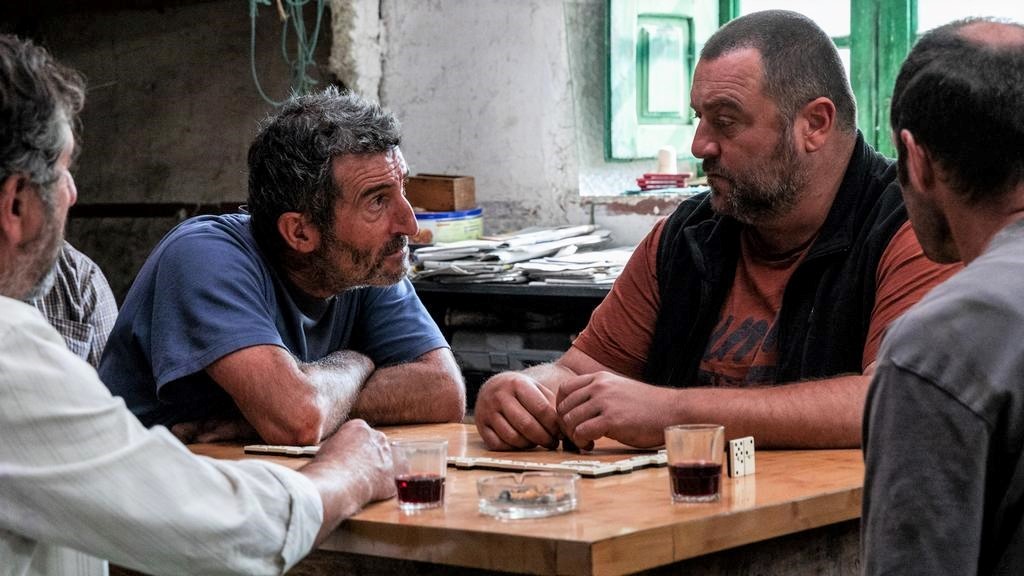If you see only one Spanish film this year, As Bestas (The Beasts) has to be it. It’s won many awards, most recently in nine categories (out of 17 nominations!) at the 37th Goya Awards: Best Film, Best Director, Best Actor, Best Supporting Actor, Best Original Screenplay, Best Cinematography, Best Editing, Best Sound, Best Original Score.
It has wowed the French too, having been named Best Foreign Film at the 2023 César Awards. No doubt there are more awards to come, to add to co-writer and director Rodrigo Sorogoyen‘ s impressive collection.
Confronting scenes
I saw As Bestas at the terrific Europa! Europa film festival in Sydney, and I imagine it will feature at the 2023 Spanish Film Festival in June and July and even get a national release in Australian cities.
It’s a great movie to see to immerse yourself in Romance languages, too, as it has a mix of Spanish, French and Galician (which is similar to Portuguese as well as Spanish).
The film starts with a confronting scene: amid an agitated pack of wild horses, three men pounce on one, grappling it and trying to haul it to the ground. The savage wrestling contest, shot in a mix of fast-paced confusion and slow motion so you can better see the terror in the beast’s eyes, is symbolic: an epic battle of wills in which one party will triumph and the other surrender. The horse wilts and meekly succumbs.
As Bestas then probes another confrontation, but with a twist: another gang of men close in on their chosen target, a stubborn mule of a man, you might say, who refuses to surrender, and must suffer the consquences. It’s a terrific psychological thriller.
Unwelcome newcomers
A French couple, Antoine and Olga (superbly played by Denis Ménochet and Marina Foïs, above) move to an isolated village in Galicia to start a new life. Why they’ve settled there is a mystery – it’s the kind of derelict place that young people flee as soon as they can.
The few women in the village mostly remain indoors, and the half-dozen old men gather in the sole bar at night to play dominoes and mock one another jovially. Or mostly jovially. For we soon realise the locals have a sinister dislike for Antoine. Initially their animosity is a mystery. It made me wonder if Galicians are xenophobic or if they hold political grudges against the French. Surely not! (I’ve been to Galicia and have seen the hospitality afforded by the locals to visitors doing the Camino).
Bit by bit, though, the reasons for their hatred is revealed. They resent living in abject poverty, reeking of cow dung, and blame Antoine for blocking their escape route. Xan (played with terrific menace by Galician actor Luis Zahera, below left) is the leader of the gang. Zahera and Ménochet both won Goya awards for their roles in As Bestas.
Initially Marina Foïs’ character, Olga, is kept largely in the background, but as events unfold, including clashes with her daughter who begs her to return to France, she comes to the fore. She’s the epitome of determination and resilience. Foïs, too, was nominated for a Goya award’ acting talents have also been evident on Australian screens this year, in Freestyle (En Roue Libre) which closed the 2023 French Film Festival on a high note.
Real-life tragedy and horse wrestling
The Beasts is based on a true story, that of a Dutch couple, Martin Verfonder and his wife Margo Pool, who moved to Santoalla do Monte, an isolated village in the hills near the town of Petin in Galicia, in the 1990s. Martin was murdered in 2010, but Margo still lives there, and the film is dedicated to her. More info here.
Horse wrestling is, apparently, a thing in Galicia. These photos on Reuters, from the 2018 “Rapa das Bestas” (the shaving or shearing of the beasts” traditional event in the village of Sabucedo, give you some idea of what the it involves.) M5R


